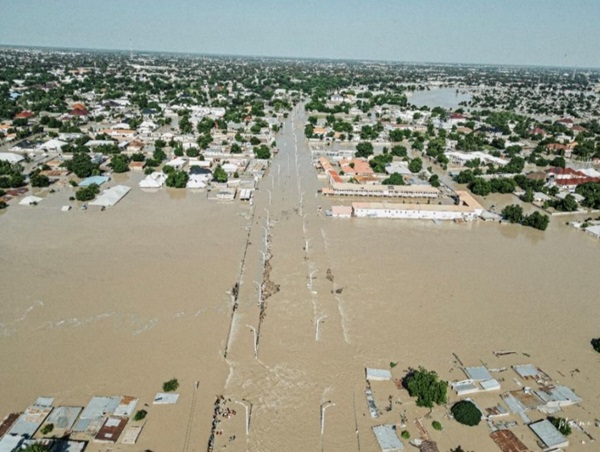
The Food and Agriculture Organisation of the United Nations (FAO) has issued a stark warning about the escalating food security crisis in Nigeria, as devastating floods continue to ravage the country.
The widespread flooding, which has affected 29 states, has not only displaced thousands but also caused extensive damage to farmland, further threatening the livelihoods of millions of Nigerians. As of early September 2024, more than 2.5 million people have been impacted, with around 200,000 displaced from their homes.
In a statement made available to journalists on September 13, 2024, FAO expressed grave concern over the worsening food security situation in the country. With nearly 31.8 million Nigerians already at risk of acute food insecurity, the floods are exacerbating an already dire situation. FAO representative ad interim, Koffy Dominique Kouacou emphasised the urgency of the situation, stating, “The floods continue to push vulnerable communities deeper into poverty and the widespread loss of farmland will severely affect food security. Urgent coordinated action is needed to avert a worsening humanitarian disaster.”
By September 10, 2024, FAO had reported that 1.3 million hectares (ha) of land were submerged, with 558,000 ha of cropland affected across the country. The floodwaters show no signs of abating, with rivers continuing to swell and dams nearing their capacity. The National Emergency Management Agency (NEMA) has issued warnings about further flooding, particularly in the northeast and western regions of Nigeria. The states most at risk include Borno, Bauchi, Bayelsa, Enugu, Jigawa, Kano, Kebbi, Kogi, Niger, Sokoto, Yobe and Zamfara.
FAO stressed the need for enhanced infrastructure, improved early warning systems, and rapid response mechanisms to mitigate the impacts of the floods and build long-term resilience against future disasters. Kouacou noted that the upcoming October−November 2024 analysis of the Cadre Harmonisé would provide a clearer picture of the floods’ impact on food security and nutrition in Nigeria and the broader region.
The northeastern states of Adamawa, Borno and Yobe have been particularly hard hit by the floods. In these three states alone, approximately 880,000 people have been affected and nearly 300,000 hectares of farmland have been destroyed. Borno State, in particular, has seen significant devastation following the collapse of the Alau Dam in Konduga local government area (LGA) on September 10, 2024. The floods have wreaked havoc on the Maiduguri Metropolitan Council (MMC) and Jere LGAs, impacting over 239,000 people. An estimated 50 per cent of Maiduguri, the capital of Borno State, has been affected by the flooding.
The floods have disrupted essential services such as hospitals, schools, and markets, while also causing substantial damage to critical infrastructure, including bridges. Authorities in Borno State have initiated evacuations from high-risk areas and have established eight centers to temporarily house evacuees. The region is now on high alert for outbreaks of waterborne diseases, including cholera, malaria and typhoid, in addition to animal and zoonotic diseases.
Meanwhile, Adamawa State is facing an imminent threat from the discharge of water from the Lagdo Dam in Cameroon, which could lead to further flooding in the region.
The United Nations Office for the Coordination of Humanitarian Affairs (OCHA) is spearheading the response efforts, working closely with Nigerian authorities to provide immediate assistance to affected communities. FAO, in collaboration with OCHA, is supporting NEMA and the State Emergency Management Agencies (SEMA) in assessing the immediate needs of flood victims and delivering aid. In Maiduguri, efforts are underway to provide support to displaced persons, including the reopening of eight internally displaced persons (IDP) camps and the distribution of food and essential non-food items.
FAO has called for immediate and flexible funding to support ongoing humanitarian relief and early recovery efforts in the flood-affected areas. The organisation is working closely with local authorities to assess the impact of the floods on agricultural assets and livelihoods, while also strengthening early warning systems to help mitigate the impact of future disasters. FAO has also appealed to the international community for continued advocacy and support to help Nigeria navigate this evolving crisis.
FAO remains committed to assisting Nigeria in addressing the urgent challenges posed by the floods, preventing further deterioration of the humanitarian situation and strengthening the country’s resilience to future disasters. Kouacou emphasised the importance of a coordinated and swift response to avoid a prolonged disaster that could deepen food insecurity in Nigeria and push more people into poverty.


